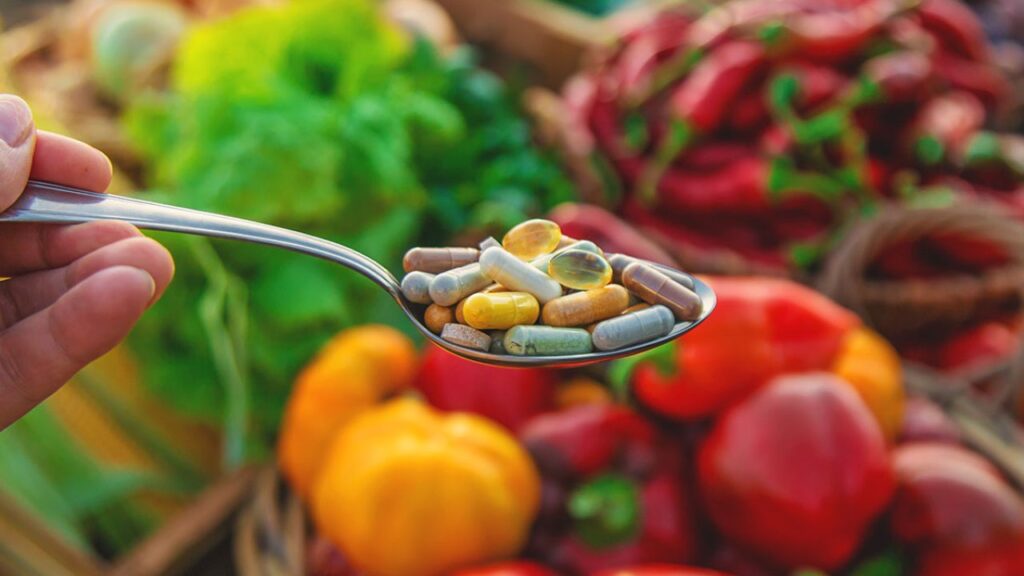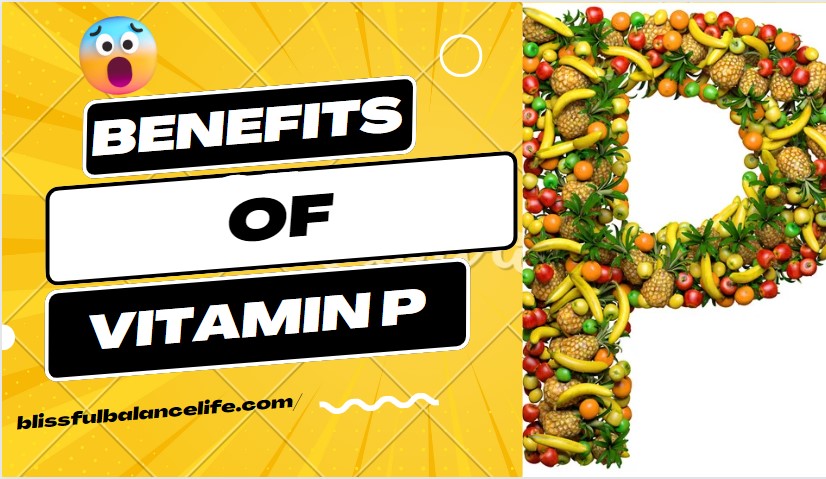We’re sure everyone must have heard about different vitamins and how important they are for our optimal well-being. However, one vitamin that is often overshadowed by its other vitamin counterparts is vitamin P. This often-overlooked micronutrient is also known as flavonoids. It is not an actual vitamin but a class of phytonutrients with antioxidant and anti-inflammatory characteristics. It is usually found in plant-based foods and is a source of multiple health benefits. Keep reading to learn all you need to know about Vitamin P.
What is Vitamin P?
It is important to understand that the term Vitamin P is not commonly used in modern nutritional science; it was previously used to refer to bioflavonoids or flavonoids. Bioflavonoids, including flavonoids, are antioxidant compounds that are derived from plants and are often associated with numerous health advantages. Therefore, vitamin P offers a wide range of health advantages as well.
Sources of Vitamin P
Vitamin P is found in multiple food sources that we consume on a daily basis. The following are the best sources of Vitamin P:
1. Green Leafy Vegetables
We have all heard the importance of having our leafy greens since childhood, and for a good reason. These vegetables are an excellent source of flavonoids, such as quercetin. Kale, broccoli, and spinach are not only low in calories but are high in nutrients as well, which makes them nutrient-dense.
2. Citrus Fruits
While citrus fruits are mostly famous for their high vitamin C content, you’ll be pleased to know that these zesty treats are also packed with the goodness of vitamin P. Therefore, lemons, oranges, grapefruits, guavas, kiwi, and all the other tangy citrus fruits are an excellent source of vitamin P. These fruits are a great source of flavonoids, such as hesperidin and naringenin.
ALSO READ: HIGH FUNCTIONING DEPRESSION – THE COMPLEXITIES, SIGNS, AND THE SOLUTION
3. Green Tea
Most people associate green tea with weight loss due to its exceptional antioxidative properties. Green tea is abundant in multiple nutrients that complement our daily diet. Green tea is packed with a special flavonoid called catechins.
4. Berries
Who doesn’t like berries? You can have them as they are or sprinkle them on your early morning smoothie bowls. Berries are a rich source of flavonoids such as anthocyanins.
5. Apples
An apple a day keeps a doctor away because apples are loaded with quercetin, which is a potent flavonoid. The skin of the apple is an excellent source of quercetin. Therefore, it is always recommended to have apples with their skin. Moreover, red and yellow apples are more likely to have a higher content of flavonoids or Vitamin P.
6. Dark Chocolate
Dark chocolate is known for being a stress-free indulgence due to its high nutrient content. Furthermore, good quality dark chocolate contains 70% cocoa content, which is a flavonoid powerhouse. So, when you’re satisfying your sweet tooth with this tasty treat, it’s important to remember that not only does it taste divine, but it’s also loaded with catechins and procyanidins.
7. Red Wine
Red wine is one fruitful indulgence since it’s packed with flavonoids like resveratrol. Resveratrol is famous for improving cardiovascular functions. It’s important to remember that red wine, like all alcoholic drinks, should be consumed moderately. So, sit back with your glass of red wine, enjoy the moment, and let the flavonoids do their magic.
Benefits of Consuming Vitamin P
This micronutrient offers a list of health benefits that are enlisted as follows:
1. Improves Heart Health
Bioflavonoids are also known as the unsung heroes of optimal cardiovascular well-being. They improve the functioning of the arteries and veins, leading to a healthier circulation of blood throughout the body. This not only reduces the risk of diseases such as atherosclerosis but also keeps the blood vessels clear, preventing any type of build-up in them.
2. Vitamin P for Immune System Support
The antioxidative property of bioflavonoids works wonders for neutralizing free radicals, which strengthens the immune system. They work to guard the immune cells and offer protection against all types of oxidative damage. This increases the immunity of your body and keeps you safe from all sorts of infections.
3. Alleviates Inflammation
Bioflavonoids work exceptionally well to reduce inflammation in the body. They contain anti-inflammatory properties that effectively go deep within the body to reduce the symptoms of inflammatory diseases such as arthritis.
ALSO READ: BEST WORKOUT ACCOUNTABILITY APPS 2024 THAT YOU SHOULD TRY
4. Skin Health Enhancer
Everyone likes good skin. However, there are certain skin conditions that go beyond the pimples and pigmentation. We’re referring to varicose veins that appear as a result of broken capillaries and internal bruising. It helps to strengthen the skin barrier and fortifies the capillaries to reduce the appearance of varicose veins.
5. Vision Protector
While eyes are the windows to the soul, they are also your window to the world. Hence, it’s imperative to have good vision, and Vitamin P improves our vision with the help of two bioflavonoids, rutin and hesperidin. They work to support the functioning of the thin blood vessels in our eyes. They not only help improve your eyesight but also help with retaining optimal vision as you age.
6. Improves Brain Function
Optimal brain function is essential for our overall health. The bioflavonoids present in vitamin P are extremely beneficial in improving memory, enhancing attention span, and improving overall cognitive functioning. It gives your brain the boost it needs to carry out its functions properly.
7. Anti-Cancer Properties
It is a rich source of flavonoids, and flavonoids have recently been highlighted for their anti-cancer potential. These micronutrients can reduce the spread of cancer cells, especially in the lungs, colon, and breast.
8. Allergy Relief
Dealing with allergies can make life very difficult for some people. However, the good news is that flavonoids are known to offer allergy relief due to their antioxidative and anti-inflammatory characteristics. Therefore, Vitamin P is a blessing in disguise for people dealing with congestion, sneezing, and itching.
9. Enhances Joint Health
Since vitamin P is known for its anti-inflammatory properties, it can also help deal with inflammatory diseases such as arthritis. The bioflavonoids found in it help minimize stiffness and pain and have a soothing effect on the joints, making it easier to move them around without any discomfort.
10. Antiviral Properties
We all know that viral infections only go away once the virus has completed its life cycle. However, the symptoms of these infections can be dealt with, and vitamin P is an excellent product for curbing antiviral properties. The flavonoids present in vitamin P improve the defense mechanism of the body against viruses. The vitamin might not offer a permanent solution for the issue at hand, but it can definitely reduce the symptoms and make you feel at ease during a viral infection.
11. Regulation of Blood Sugar Levels
Regulating blood sugar levels is another feather in the hat of Vitamin P. We all know how elevated blood sugar levels can lead to diabetes and multiple other health problems, such as heart complications. Therefore, increasing vitamin P intake assists with reducing blood sugar levels and helps them stay at normal levels.
Dosage of Vitamin P
A balanced diet is crucial for a healthy life. At present, there is no recommended intake of Vitamin P or flavonoids. However, if one has a well-balanced diet that is rich in fruits and vegetables, then they will be getting the essential amount of vitamin P from the food they eat. While vitamin P supplements are present in the market, this means that having vitamin P supplements is not too essential. Quercetin is one of the most commonly sought-after vitamin P supplements. Since there are different types of flavonoids, each one of them could have their own recommended dosage quantities. However, the adverse effects of overdosing on these supplements are also unknown.
Nevertheless, having vitamin P in very high doses can impact the thyroid gland and negatively affect the overall nutrient composition of the body. Furthermore, most of these supplements lack the check balance of the FDA, which is why they could have different levels of flavonoids than the ones suggested on the bottle. Moreover, it’s crucial for pregnant and lactating women to consult their healthcare providers before going for any kind of supplementation.
Final Word
While everyone has heard of vitamins A, B, C, D, E, and K, vitamin P is a relatively lesser-known vitamin. However, its numerous health benefits make it worth knowing. Vitamin P is commonly found in citrus fruits and leafy green vegetables; it can easily be consumed from our regular intake of food; however, it also comes in the form of supplements that might cause thyroid dysfunction if overdosed. The flavonoids present in vitamin P are extremely helpful in improving heart health, eye health, skin health, and joint health, and they also serve anti-allergy, anti-cancer, and anti-inflammatory effects. Therefore, for everyone who has been sleeping on vitamin P, now is the time to start reaping the benefits of this vitamin



